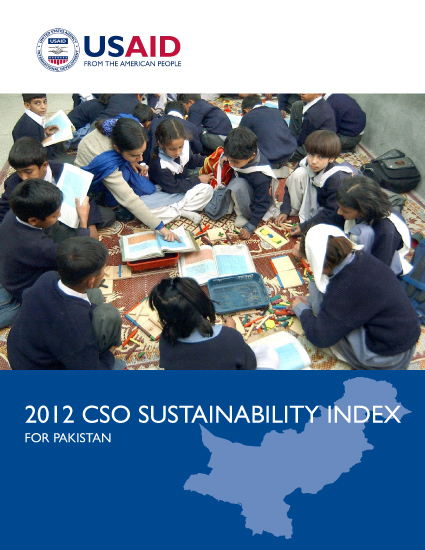- What We Do
- Agriculture and Food Security
- Democracy, Human Rights and Governance
- Democracy, Human Rights and Governance Strategy
- Supporting Free and Fair Elections
- Supporting Vibrant Civil Society & Independent Media
- Protecting Human Rights
- Promoting Accountability & Transparency
- Importance of Democracy, Human Rights, & Governance to Development
- Countering Trafficking in Persons
- Economic Growth and Trade
- Education
- Ending Extreme Poverty
- Environment and Global Climate Change
- Gender Equality and Women's Empowerment
- Global Health
- Water and Sanitation
- Working in Crises and Conflict
- U.S. Global Development Lab
BACKGROUND
2012 CSO Sustainability Index - Pakistan ![]() (pdf - 790k)
(pdf - 790k)
The 2012 CSO Sustainability Index (CSOSI) for Pakistan looks at the sustainability of the civil society sector based on an assessment by local civil society representatives and experts. The CSOSI is an important tool for civil society organizations (CSOs), governments, donors and academics for understanding and measuring the sustainability of the CSO sector. This publication complements other editions of the CSOSI which together cover over sixty countries and territories in Central and Eastern Europe and Eurasia, Sub-Saharan Africa, the Middle East and North Africa, and Afghanistan.
APPROACH
The Index analyzes and assigns scores to seven interrelated dimensions of CSO sustainability: Legal Environment, Organizational Capacity, Financial Viability, Advocacy, Service Provision, Infrastructure, and Public Image. These scores are average to produce an overall score. Details of the methodology can be found here.
FINDINGS
CSOs in Pakistan range from small voluntary organizations dependent on donations from their communities to well-established CSOs that employ full-time professionals. The majority of CSOs are faith-based organizations (FBOs) that provide religious education. According to a statement by the Minister of Social Welfare and Special Education in 2010, there were approximately 100,000 NGOs and community-based organizations (CBOs), 60,000 to 70,000 of which were registered.
The year 2012 was turbulent, but in the face of volatility, CSOs continued to engage actively in relief activities while also organizing demonstrations for the rights of minorities and women. Civil society in Pakistan has increasing influence on public policy in the areas of environmental protection, civic and voter education, child labor, youth affairs, women’s and children’s rights, and education. CSOs provide a wide range of services in fields ranging from health and education to environment and humanitarian assistance. CSOs are accelerating their efforts to build new constituencies.
The legal environment offers a variety of ways in which to register and provides a favorable tax regime. This environment deteriorated slightly in 2012, largely as a result of new procedures in Khyber Pakhtunkhwa (KPK) province that require all CSOs to obtain permission to undertake activities in specific districts. The organizational capacity of CSOs in Pakistan varies according to the size of the organization. CSOs working in education, health, and emergency services are able to harness indigenous funding from the business sector, community donations in the form of Zakat (religious giving) and in-kind donations, and government-sponsored institutions. Traditionally, small CSOs have been able to attract volunteers and discounts from local businesses; however, there was an apparent decline in volunteerism in 2012, with the exception of relief activities. CSOs engaged in advocacy and public policy continue to rely on donor support. In 2012, academic institutions significantly increased their support to CSOs in the areas of public policy, research, and capacity building. CSOs increasingly used social media platforms to promote awareness of and support for a wide range of social welfare issues.








Comment
Make a general inquiry or suggest an improvement.